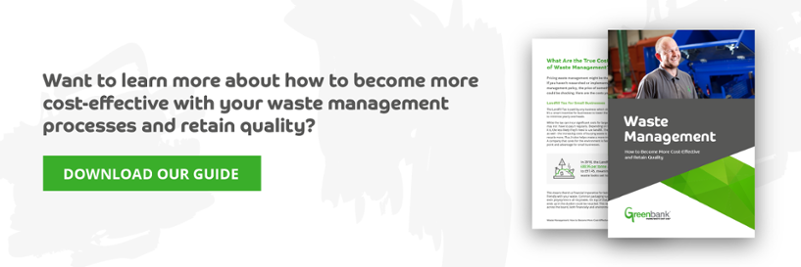The UK Government provides a clear set of rules and responsibilities for employees and business owners when it comes to waste disposal. The waste disposal regulations for businesses are crucial practices that all businesses, regardless of size, need to undertake.
But don’t worry, they’re not complicated and have been made for your benefit. Here’s the information you need on waste disposal regulations.
- What Business Waste Is Being Targeted?
- The Responsibilities of a Business
- Disposing of Waste in the UK
- Moving Waste Abroad
What Business Waste Is Being Targeted?
Businesses in the UK need to be responsible with their waste. But what counts as ‘business waste’? It’s pretty simple.
Any waste that comes as a product of any commercial activity is defined as business waste. This could mean broken or useless material from construction or demolition work, agricultural waste and any industrial waste – but for businesses, this is usually smaller things such as cardboard packaging, polythene and plastic strapping. These are the most common waste types for businesses and they’re also the easiest to dispose of.
The Responsibilities of a Business
Waste is an important topic for all businesses because all businesses produce waste – and if you’re not careful with how you handle it, you could be subject to penalties. For example, businesses must pay landfill tax (currently priced at £91.45 per tonne) if using landfill.
On top of that businesses have a duty of care when it comes to properly storing waste and any infractions may result in a £300 fine.
On their website, the UK Government requires businesses to undertake a number of key practices when it comes to waste disposal regulations:
- Sort and store your waste properly, in a safe and secure manner.
- Produce and complete a waste transfer note for any waste load that leaves your business premises.
- Ensure your waste carrier is properly registered to dispose of waste. (You can check if they’re registered here).
- Report any illegal waste activity (such as if your waste carrier is not registered).
- Practise waste management and recycling techniques to ensure your business keeps waste to a minimum.
How To Store Waste and Hazardous Waste
Sorting and storing waste effectively is a simple process. First, you need to pick a secure place to store it before it’s taken for any disposal procedure (this could be in skips, bins or cages of varying sizes). On top of that, you must also:
- Store waste in secure containers to prevent overflowing.
- Label these containers.
- Make sure it’s contained within waterproof containers to ensure no contaminated runoff is possible.
Similarly, with hazardous waste, you need to store each type separately so there’s no cross-contamination. Hazardous waste counts as things such as asbestos, batteries, solvent, pesticides and other materials that could cause harm to humans or environments.
Disposing of Waste in the UK
Businesses can work with registered waste carriers. A waste carrier is an organisation who can transport, buy, sell or dispose of waste. However, businesses can register themselves to carry and dispose of their own waste.
If you decide to do this, it’s incredibly important that you register as a waste carrier. If you don’t, you could face up to a £5,000 fine.
There are also a number of disposal regulations for businesses that differ depending on the type of waste you’re producing. Because of this, you may have to apply for a permit.
Moving Waste Abroad
It’s against the law to move waste abroad for disposal, for example, sending it to another country for landfill. However, you can import or export waste to recover it or use it as a commodity, such as using biological waste to produce energy. There are a lot of rules when it comes to importing or exporting waste, such as classifying it, applying for notification controls and having the proper contract set up, You can read the government guide on waste recovery here.
On top of specific regulations, businesses also need to get in control of their waste management processes, ensuring they’re efficient, compliant and good value for money. You can learn how to do that through our helpful guide.
Get to Grips With Your Waste Management
Our guide covers how to make your waste management procedures more cost-effective whilst also retaining the quality of their operations. It’s an important consideration for any business. Inside, you’ll find the information on the true costs of waste management and best practices for creating a well-developed and successful waste management policy.
Just click the link below to download a copy.

Waste Management Solutions




